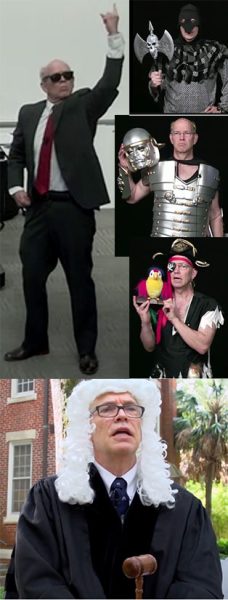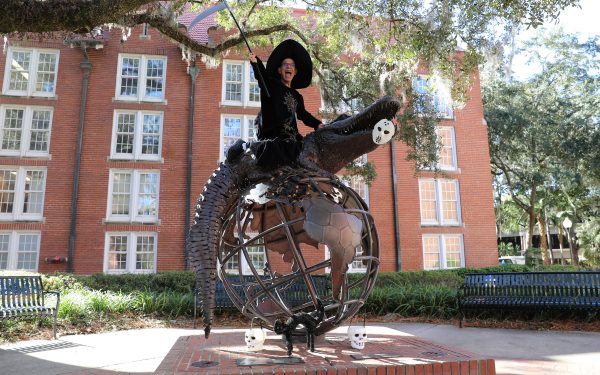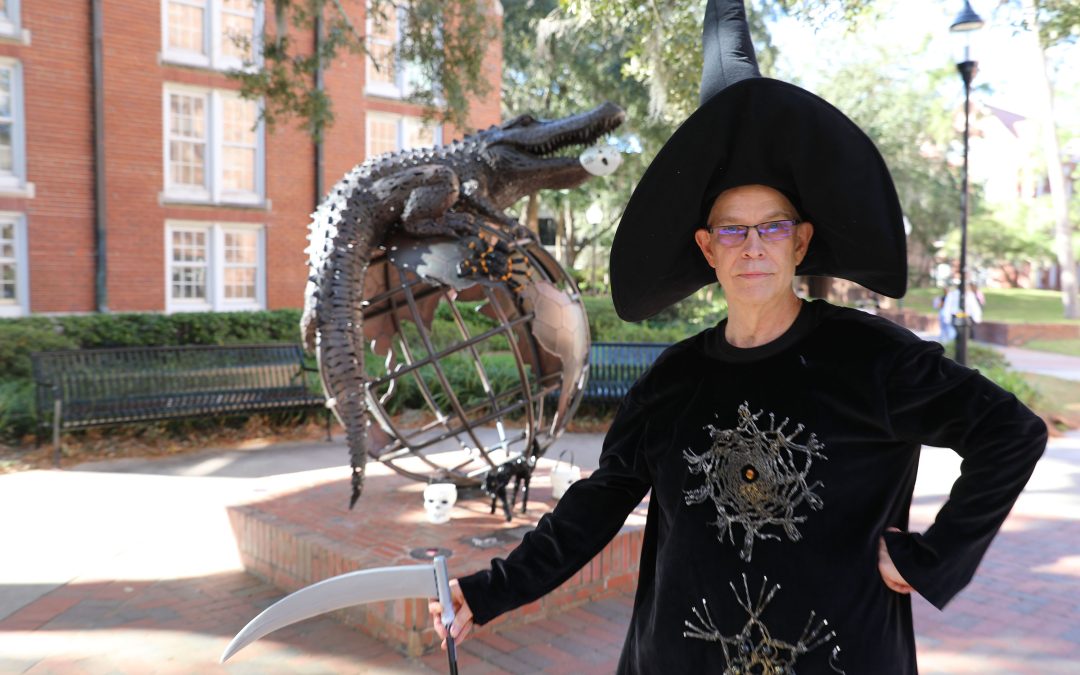Legal theatre
How Robert Emerson connects bastards, battle cries & business law for an unforgettable classroom experience.
“The Continental European law system can be traced back to its roots in what source of law?”
Huber Hurst Professor Robert Emerson of the University of Florida Warrington College of Business brandished a plastic sword at the front of the classroom, emphasizing his lecture on business law.
The Justinian law system can be traced back to the eleventh century, he explained, and signaled to one side of the room. Two groups of students shuffled in front of the lectern, sporting French and English flags and holding their own toy swords at the ready.
Introducing himself as William the Bastard, Emerson queued lively orchestral music and, with a Monty Python-esque battle cry, commenced the Battle of Hastings.
“I blow my nose at you, sir!” Emerson cried, parrying a jab from his opponent. Around him, students grinned as they sparred between desks. Finally, with a theatrical swoon, a student holding the English flag fell to the floor, and the French team high-fived in victory.

“You could cover material quicker if you just stuck to the narrow path of ‘this is what you need to know,’” he explained, “but to my mind, that’s less memorable. It’s boring, and I think it may be harder for people to really learn from it – I find it hard to learn, even. It’s not that I just have to be entertained, but I want hooks and other things that bring me in, and if people don’t do that, I think it’s harder to follow sometimes.
“You understand a lot better if you experience it.”
To build these experiences for students, Emerson portrays many of the ideas raised in class with life examples – his own, and those pulled from the zeitgeist. Portraying them in theatrical form comes naturally to Emerson with his background in school and community performances and a documentary.
When they were young, Emerson’s kids would spend their days off from school participating in skits for his lectures; since then, the classroom dramas have grown to include volunteering students. Aside from being fun, Emerson finds that the skits have a positive impact on classroom learning.
“It’s interesting how often I’ll be asked a question after a skit [that] I’ve never been asked before, and we’ve been doing that skit for 10 years or 20 years,” he said.
Students taking business law can anticipate being greeted by Emerson wearing an abundance of hats, both from his costume wardrobe and his professional background. After finishing graduate school at Harvard Law, Emerson worked as a litigator at various law firms in Baltimore, wrote law journal articles and co-authored a business law book while teaching part-time at Johns Hopkins University and Harford Community College until 1988, when he was offered a full-time position at the University of Florida. Since then, he’s made the most of his opportunities to conduct research, publish books, teach abroad and pass on his academic and professional knowledge to students.
A mainstay of Emerson’s class is the Rule of Law. While answers to specific legal problems are often debatable, Emerson reminds students that “there’s a consensus on core values: democracy; fair, commonly known and evenly enforced laws; independent lawyers and judges.”
Emerson likes being a valuable resource to students by offering them advice from his diverse background. If there was one thing he’d want students to take away from his class, Emerson says it would be an understanding of short term gain versus long term gain, and why it isn’t worth it to cut corners when it comes to the law.
“Short term gain may be that I win this deal, or I get this person in power, or I evade responsibility for a choice I made that I probably shouldn’t have made, but over the long term such an approach is definitely bad for society,” he explained. “The individual receives those short-term gains at the expense of a higher value, and in the end it often even is bad for the individual who made that choice.”
Though he has no current plans to retire, Emerson thinks he might eventually dedicate his time to authoring more books or diving deeper into other creative pursuits, such as writing poetry and joining ensembles in community theatre productions. Being his whole self in his profession and personal life is important to Emerson, and he makes the most of the connections between his interests.
“Truth and justice and law are all tied together, and for all three of these words the context really matters,” he shared. “To understand them, I include art and music and drama. Even beauty is part of tying all these concepts together.
“Beauty is a very broad concept, but with all these things that are so core to our lives as individuals and as a community, I try to get students to see how law can be a thread between so many strands of life. The law is as old as any social construct, and to learn the law can be a way to understand life. And,” he laughed, “of course, vice-versa.”





